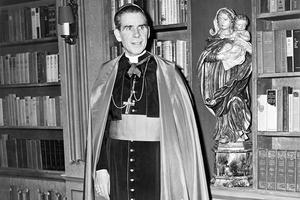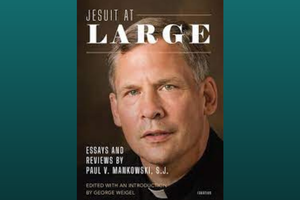Reborn for Worship
BOOK PICK: The biblical roots of baptism theology are thoroughly examined in Dominican Father Isaac Augustine Morales’ new book.

THE BIBLE AND BAPTISM
The Fountain of Salvation
By Father Isaac Augustine Morales, O.P.
Baker Publishing Group, 2022
256 pages, $22.99
No matter how many baptisms you’ve attended, I suspect you’ve only heard a handful of readings from Scripture. The Rite of Baptism provides more than 20 readings, from the Old Testament, the Psalms, the New Testament and the Gospels.
But most priests (myself included) confine themselves to just a handful at a Baptism. They probably read one of the Gospel scenes of Our Lord’s baptism or his conversation with Nicodemus. An obvious reason for this is that these passages are the most familiar to the congregation. A less edifying reason is time constraints: At your typical parish baptisms are done in between other ceremonies. Further, an obstreperous child would make longer readings an unwise choice. Another, even less edifying, reason is that this limitation saves the minister from the work of coming up with a new homily at every ceremony.
Dominican Father Isaac Augustine Morales’ new book, The Bible and Baptism: The Fountain of Salvation could change all this, at least for the minister.
His in-depth look at the biblical roots of baptism theology is a boon for those seeking to understand and teach the meaning and the beauty of the sacrament that is the “gateway to life in the Spirit, and the door that gives access to the other sacraments” (Catechism, 1213).
Father Morales opens up the Scripture passages about baptism and thus enables the minister to speak more deeply about more passages from the Bible. The danger is that this book could upend parish schedules and try the patience of parents as the priest displays his newfound knowledge!
Father Morales systematically examines the principal biblical passages that touch on baptism. He walks the reader through the various meanings and complexities of water in the Old Testament; how it signifies new life, destruction, liberation and cleansing all at once, and how it points to Christian baptism.
In turning to the Gospels, Father Morales brings out how Our Lord’s words and actions build on and fulfill the Old Testament teaching and typology even as they establish the new kingdom and new worship. In examining the New Testament letters, he draws out the meaning of baptism for both the individual Christian and the Church as a body.
A theme Father Morales returns to again and again — in effect, a golden thread through the whole book — is: Baptism leads to worship. This is of particular importance for the minister.
At baptisms, we priests are frequently speaking to families that are not (how shall we put it …) overly concerned about coming to Sunday Mass. The pastoral challenge is to engage those families and, by the grace of God, bring them to realize the future import of their child’s baptism. What they are asking (whether they realize it or not) is not just baptism for their child on that day but also something in the future. Baptism is designed for and oriented to the child’s worship — at Mass in this world and at the table of God’s children in heaven.
This truth is embodied liturgically at the end of the Rite of Baptism when the priest is to lead the family in procession from the baptismal font to the altar. Thus, what happens in baptism brings the child to the altar of sacrifice and the table of the Eucharist. We are already looking ahead to the child’s First Communion. Father Morales’ work is helpful in bringing out the meaning and importance of that simple procession.
This book strikes me as a difficult project, as the author has to make the biblical texts accessible to the ordinary reader (e.g. the busy parish priest) while at the same time doing justice to the exegetical and theological complexities and disputes that lurk beneath them. As such, Father Morales is at times somewhat folksy in his writing and at other times academic, clearly trying to acknowledge distinctions that, if he took more time with them, could lead to a much longer and less accessible book. It’s a fine needle to thread and Father Morales does it well.
This is the first of the Catholic Biblical Theology of the Sacraments series, edited by Tim Gray and John Sehorn of the Augustine Institute. It’s an important project of great help to all Catholics, but especially to ministers of the sacraments. The more deeply a priest is rooted in the scriptural foundations and teaching on the sacraments, the more confidently he can communicate those truths in his teaching and in the liturgies themselves. On the basis of this book, we should look forward to the others.
The Bible and Baptism
In this free six-episode book study, Dr. John Sehorn, Academic Dean of the Augustine Institute Graduate School of Theology, sits down with Fr. Isaac Morales, OP, a Dominican friar of the Province of Saint Joseph and Associate Professor of Theology at Providence College, to discuss Fr. Isaac’s book The Bible and Baptism: The Fountain of Salvation (Baker Academic). Watch The Bible and Baptism now!














